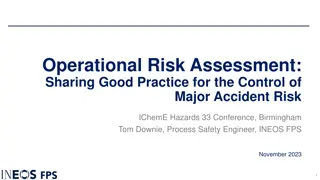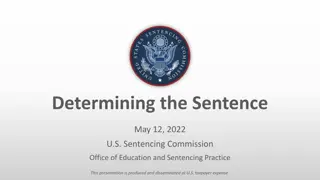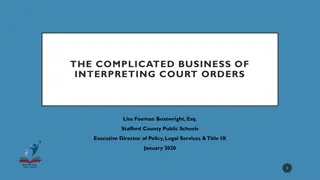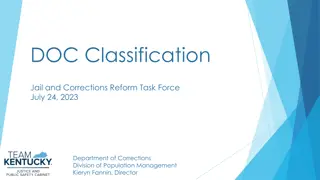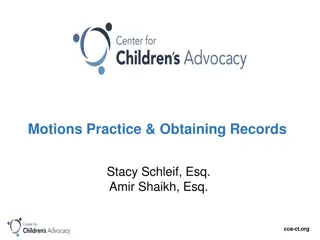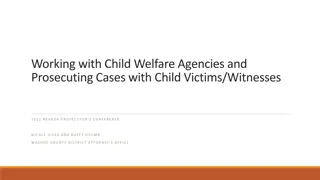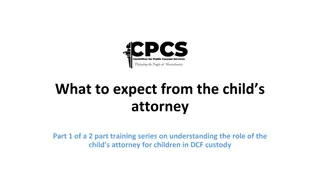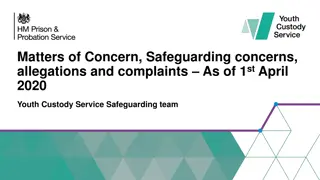Understanding Risk Assessment in Child Custody Cases
This content delves into the crucial aspect of risk assessment in child custody cases, highlighting the legislative framework, factors considered, and the importance of protecting children from harm. It discusses key points from legal cases and emphasizes the complex nature of determining and measuring risk in parenting cases. The content underscores the significance of judges thoroughly evaluating the facts to ascertain the presence of unacceptable risks to the child's well-being.
Download Presentation

Please find below an Image/Link to download the presentation.
The content on the website is provided AS IS for your information and personal use only. It may not be sold, licensed, or shared on other websites without obtaining consent from the author. Download presentation by click this link. If you encounter any issues during the download, it is possible that the publisher has removed the file from their server.
E N D
Presentation Transcript
In the Marriage of RRR Risk, Recovery & Relocation
1. RISK The Law legislative framework S60CA Court must regard the best interests of the child as the paramount consideration S60CC(2) and (3) set out the factors to be considered in determining what arrangements would be in the best interests of the child S60CC(2) & (2A) confirms that greater weight must be given to the need to protect a child from harm of the 2 primary considerations,
The Law case law Many cases attempting to deal with how to determine risk and unacceptable risk to children. Bant & Clayton (2019) FLC 93-924 (Strickland, Ainslie-Wallace and Ryan JJ) in summarizing a number of the founding cases on risk said at [38]-[41]: [38] In M v M (1988) 166 CLR 69 at 78 ( M v M ) the plurality of the High Court considered the assessment of the existence and magnitude of a risk in the context of sexual abuse of a child and said: Efforts to define with greater precision the magnitude of the risk which will justify a court in denying a parent access to a child have resulted in a variety of formulations. courts are striving for a greater degree of definition than the subject is capable of yielding. In devising these tests the courts have endeavoured, in their efforts to protect the child s paramount interests, to achieve a balance between the risk of detriment to the child from sexual abuse and the possibility of benefit to the child from parental access. To achieve a proper balance, the test is best expressed by saying that a court will not grant custody or access to a parent if that custody or access would expose the child to an unacceptable risk of sexual abuse. [39] It is to be remembered that the concept of unacceptable risk referred to in M v M was within the framework of resolving the wider issue namely what is in the best interests of the child and to which the resolution of the existence of an unacceptable risk is subservient (see M v M at 76; B and B (1993) FLC 92-357).
[40] The process by which a risk is identified and its magnitude measured cannot, in parenting cases, be subject to rigid mathematical or empirical assessment. As the High Court said in CDJ v VAJ (1998) 197 CLR 172 ( CDJ v VAJ ) at 218: 151. Given the nature of applications for parenting orders, there must often be a real chance that the order under appeal is not in the best interests of the child. Such applications necessarily involve predictions and assumptions about the future which are not susceptible of scientific demonstration or proof. Perceptions, predictions guesswork can all play a part in the making of an order. and even intuition and [41] Representative (1996) FLC 92-655 at 82,713 82,714, Fogarty J said of this determination: As long ago as 1995, in N and S and the Separate Thus, the essential importance of the unacceptable risk question as I see it is in its direction to judges to give real and substantial consideration to the facts of the case, and to decide whether or not, and why or why not, those facts could be said to raise an unacceptable risk of harm to the child.
The Law Application But how do we actually assess the risk? Cases such as M v M [1988] FLC 91-979; N & S & The Separate Representative (1996) FLC 92-655 have suggested that there needs to be a real and substantial consideration of the facts of the case in order to assess both the likelihood of risk and the magnitude of risk. But again, what does that mean in reality and how do we do that? Helpfully, the case of Harridge v Harridge [2010] FamCA 445 sets out some practical questions which can be asked in undertaking the assessment such as: 1. What harmful outcome is potentially present? 2. What risks are probably in the situation in the short, medium and long term? 3. What are the factors that could increase or decrease the risk? 4. What measures are available to mitigate the risk?
The Law Interim Hearings Court is faced daily with the challenge of assessing risk on an interim basis without all of the evidence that would be available at a final trial or the benefit of cross examination. Very difficult. As we know though from the case of Deiter & Deiter [2011] FamCAFC 82, Finn, Thackray and Strickland JJ determined that: 1. when faced with inconsistencies, the Court cannot ignore untested evidence but must deal with such evidence carefully and in light of the uncontested evidence; and 2. the court is not required to wait for every last piece of evidence to be placed before it in order to make a decision on an interim basis. Further, whilst there will inevitably be competing claims of risk as between the parties, the Court is tasked with the need to weigh the probabilities of competing claims and the likely impact on children in the event that a controversial assertion is acted upon or rejected - Observed in Eaby & Speelman [2015] FamCAFC 104 affirming SS v AH [2010] FamCAFC 13
Reality in Practice I know the law, but what does it all actually mean when dealing with families? 1. The concept of Risk is different to Unacceptable Risk 2. There needs to be an assessment of the risk complained of to determine the parenting arrangements not simply sufficient to allege risk 3. You need to obtain as much information and evidence as possible in relation to the risk alleged this doesn t mean though that an Interim Hearing cannot be heard until after a Family Report has been prepared for example
Risk vs Unacceptable Risk Risks are inherent in everyday life. Everyone is exposed to risks on a daily basis. Parents expose their children to risk all the time riding to school, going out to the movies with friends etc. learning how to manage and deal with risk is a skill that children need to develop and hence why we make these decisions for them all the time. being exposed to some risk and My thoughts what makes a risk an unacceptable risk depends on the gravity of harm that the risk poses and the protections that can be put in place to alleviate that risk. Eg. A 5 year old wanting to ride to school on their own poses a different level of risk than a 12 year old doing so. The distances between home and the school might be a factor or whether the child needs to cross a busy intersection.
Assessment of risk Bearing in mind the helpful comments in Harridge, my view is that the following questions are important to consider when evaluating risk: 1. Who is the risk? Is it the other parent? Is it the step parent or step child? Is it a family member? 2. What is the risk Define the risk and be precise about what the risk is. Don t use just the buzz words . a. Drug use what drugs? History of use? b. Alcohol abuse what sort of alcohol? History of alcohol use? c. Mental health what is the diagnosis (if any)? Treatment? Medication? d. Family Violence is it physical, emotional or financial? Give specific examples.
3. Why is it a risk Be precise. How does the risk impact the child including considerations such as: a. Are the children usually present when the risk is there? b. Have the children been exposed to the risk? c. If so, how have they reacted to that risk/behaviour how did it impact them? d. How old is the child and do they have access to other trusted adults who would assist them if they needed to self protect 4. When is the risk of most concern? a. Is it all the time? b. Is it at night time only? c. Is it over a weekend when there is a party? d. Is it during a specific time of year only?
5. Where is the risk most likely to occur? a. At the other parent s home? Or only when visiting certain homes such as family members? 6. How can all of the above answers work towards mitigating that risk? a. Might be injunctions against a certain person; b. Drug and alcohol testing; c. Different time arrangements.
Evidence Once answered, those questions inform you about what evidence you will need to put before the Court. For example: 1. Do you request that the other parent undertake drug and/or alcohol testing? 2. Do you request evidence from their treating mental health provider about their diagnosis and treatment plan? 3. Do you need to issue subpoenas and if so to whom? *** do not forget to ask your client what the other parent would allege about them ***
RECOVERY ORDERS Usually the application is as a result of either some sort of risk and therefore withholding of the children OR an attempt to unilaterally relocate. In terms of any recovery application though, be mindful of the process involved and the effect on the children. Determine from the outset as to whether you want a formal Recovery Order (which requires the AFP to become involved and can be traumatic for the children) or whether it is sufficient to seek an order that the other parent return the child to your client by a certain time period failing which then recovery order issue.
The Great Relocation Debate! There is an inherent tension between, on the one hand, separated parents being able to establish new homes wherever they like and, on the other, their restraint by injunction from living too far apart to avoid any impingement of their child s ability to retain meaningful relationships with both parents. The conflict is between the best interests of the children to know and have regular personal contact with each parent and the interests of the parents to enjoy a high measure of freedom of movement which is not lost by reason only of their parental responsibility for the children. (Franklyn & Franklyn [2019] FamCAFC 256 at [27]) The tension at the intersection of those conflicting interests is even greater when an order is sought, not just to restrain one parents move further away, but to compel the parent who has already moved away to return and establish a new residence closer to the other parent (Comments by the Full Court in Franklyn in reference to the High Court s decision in AMS v AIF (1999) 199 CLR 160)
DEVELOPMENT OF PRINCIPLES IN RELATION CASES: Justice Boland s seminal decision in Morgan & Miles [2007] FamCA 1230 is required reading!!! Whilst dealing with an interim relocation in that case, the decision provides a detailed consideration of the law relating to relocation prior to, and since, the amendments to the Family Law Act in 1995. Her Honour exploration of the case law included the following: AMS v AIF (1999) 199 CLR 160 A and A: Relocation Approach [2000] FamCA 751 U v U (2002) 211 CLR 238 Bolitho and Cohen [2005] FamCA 458
Established principles emerging from the case law (prior to the 1995 Amendments to the Act) in determining parenting applications where one parent wished to relocate a child s place of residence were recorded in Morgan & Miles at [59] as follows: The best interests of the child are the paramount but not sole consideration The Applicant is not required to demonstrate compelling reasons for the proposed relocation A court must evaluate and weigh the competing proposals of the parties against the relevant provisions of the Act, and may subject to procedural fairness considerations, formulate its own proposals in the best interest of the child The evaluation of the competing proposals is to be undertaken as part of the overall determination of the issue of where the child or children should live the relocation issue is not a separate issue That the objects and principles in s 60B (as it then was) informed or guided a court in apply the criteria relevant to best interests (then determined having regard to s 68F(2) factors) A Court will take into account a parent s right of freedom of movement, but that right must defer if the welfare of a child would be adversely affected.
Before the amendments to the Act in 1995, in cases where Judges were required to determine interim parenting arrangements where one party sought to relocate, or had unilaterally relocated shortly before the hearing, focused on maintaining stability for a child pending a final hearing (Cowling and Cowling [1998] FamCA19) At [80] of Morgan & Miles: Confirmed the validity of following earlier core principles : That the child s best interests remain the paramount but not sole consideration; That a parent wishing to move does not need to demonstrate compelling reasons; That a judicial officer must consider all proposals, and may himself or herself be required to formulate proposals in the child s best interests; and The child s best interests must be weighed and balanced with the right of the proposed relocating parent s freedom of movement.
That the Act does not treat relocation cases as a special parenting orders. category of Morgan & Miles at [72]
At [81] of Morgan & Miles: Confirms that the legislation now requires: Consideration of the competing proposals against the criteria now in s 60CC informed by s60B; If a parenting order is made (or proposed to be made) and the presumption of equal shared parental responsibility applies the consequences of an order for equal shared parental responsibility; But, there is not specific legislative requirement which proscribes a requirement that matters under s 60CC or s 65DAA be determined in any priority. The structured exercise can be effectively carried out by examining the issues in dispute against the relevant s 60CC factors, and then applying those findings to a consideration of the criteria of s 65DAA to craft appropriate orders.
INTERIM HEARINGS There are no separate provisions in the Act dealing with interim, as distinct from final orders, although s 61D(3) does not require mandatory application of the presumption of equal shared parental responsibility on the making of an interim order. There is no legislative mandate to consider different criteria in interim parenting application involving relocation to final applications, although the former will of necessity, be an abridged enquiry. As recorded in Morgan & Miles, prior to the amendments to the Act in 1995, generally courts prohibited a relocation on a interim basis, or made orders which provided for the return of a child if only a short period had elapsed after a unilateral relocation by one parent. The well settled environment principle that was discussed in Cowling was reconsidered by the Full Court in Goode & Goode
The following passages from Goode & Goode were quoted in Morgan & Miles: 71. The reasoning in Cowling, particularly in paragraph 22 of the reasons for decision to the effect that the best interests of the child are met by stability when the child is considered to be living in well-settled circumstances, must now be reconsidered in light of the changes to the Act, particularly changes to the objects (s 60B), the inclusion of the presumption of equal shared parental responsibility (s 61DA), and the necessity if the presumption is not rebutted to consider the outcome of equal time and substantial and significant time. 72. In our view, it can be fairly said there is a legislative intent evinced in favour of substantial involvement of both parents in their children s lives, both as to parental responsibility and as to time spent with children, subject to the need to protect children from harm, from abuse and family violence and provided it is in their best interests and reasonably practicable. This means where there is a status quo or well settled environment, instead of simply preserving it, unless there are protective or other significant best interests concerns for the child, the Court must follow the structure of the Act and consider accepting, where applicable, equal or significant involvement by both parents in the care arrangements for the child. 73. That is not to say that the stability derived from a well-settled arrangement may not ultimately be what the Court finds to be in the child s best interests, particularly where there is no ability to test controversial evidence, but that decision would be arrived at after a consideration of the matters contained in s 60CC, particularly s 60CC(3)(d) and s 60CC(3)(m) and if appropriate, s 60CC(4) and s 60CC (4A)
The guide provide by Justice Boland in Morgan & Miles is that: The legislation, including the matters referred to in Goode & Goode (previous slide) does require consideration of s 60CC, s 61DA and s 65DAA (with reference to s 4(a)) in dealing with all interim applications for parenting orders including applications involving a relocation , or where an unauthorised relocation has occurred. [86] The circumstances of the child at the time of the application or immediately before an unauthorised removal, particularly absent issues such as abuse or violence, may well be likely to be extremely relevant [87]
EXCEPT IN CASES OF EMERGENCY ???
Morgan & Miles at [88] It appears to me that the very difficult issues in cases involving a relocation, which difficulties are highlighted in the cases and referred to by the Family Law Council in its 2006 report Relocation: a report to the Attorney-General prepared by the Family Law Council, (Family Law Council of Australia, Barton, 2006) make it HIGHLY DESIRABLE THAT, EXCEPT IN THE CASES OF EMERGENCY, the arrangements which will be in the child s best interests should not be determined in an abridged interim hearing, and these are the type of cases in which the child s present stability may be extremely relevant on an interim basis. It further appears to me the comments of Warnick J in C and S remain apt and relevant to the determination of these cases. Warnick J - In my view it is clear that the interests of any child or children, including the children here, are very much connected with any questions directly affecting those children, such as a re-location, being determined by a Court without the impediment of a situation of recent development, which situation significantly alters the relationship of the child or circumstances of the child with regard to one of its parents, from what it or they had been immediately beforehand .
Emergency is often asserted by reference to: Family Violence; Abuse of Drugs and/or Alcohol; Lack of suitable accommodation; Lack of support. HOWEVER, as recognised by an ex-tempore decision by Justice Baumann in the case of Holt v Stiller [2020] FamCA 1132 where His Honour followed the decision of Justice Ainslie-Wallace in Beaton & Beaton [2020] FamCAFC 297 the argument that Boland J s decision in Morgan & Miles constituted a guideline was rejected and it was clearly stated: Further, it is apparent from the multitude of decisions of judges in interim hearings confirmed on appeal , that the principle issue in relocation cases is not whether the case is an emergency . The determination of issues regarding children whether on an interim or at a final hearing is by reference to the best interests principle. (See Stringer & Nissen (No. 2) (2019) FLC 93-922 at [26] [27]; Sawant & Karanth [2014] FamCAFC 235 at [9] [10]; Malcom & Monroe and Anor [2011] FamCAFC 16; (20110 FLC 93-460 at [106] [107]).
Beaton & Beaton [2020] FamCAFC 297 This was an appeal by the Father against an interim parenting orders by a Judge of the FCC (as it then was) on 14 July 2020 that allowed the Mother to relocate from Sydney to Melbourne with the parties two (2) children (5 years & 2 years) from a fixed date or when the boarder between NSW and VIC re-opened (whichever is the later). Brief Facts: Father was 40 years Mother was 41 years Parties: Commenced cohabitation when they married in 2012 Children were born in 2015 and 2018 Since separation Mother has been primary carer and they have spent time with the Father (time was initially supervised but progressed to unsupervised time). Mother said separation caused her significant emotional distress and she should assistance from psychologist. Mother describer herself as having panic attacks (one requiring hospitalisation); Mother grew up in Melbourne and all her family and long standing friends live there; Mother s application to relocated the children stemmed from her contention that she needed the physical and emotional support of her parents, extended family and her extensive network of friends in Melbourne. Father proposed Mother and children remain living in the former marital home or living in Sydney within 10kms from the former matrimonial home.
Beaton & Beaton [2020] FamCAFC 297 Father s Argument on Appeal (Ground 4) - Court erred in hearing the matter on an interim basis in a busy duty list and it was also submitted that the primary judge erred in not considering whether instead of being heard on an interim basis, the application ought to have had a fuller, expedited hearing or have been transferred to the Family Court. It was argued that by hearing the matter on an interim basis, without cross-examination, Her Honour s decision did not take into account the full effects of the parties evidence and thus hampered her capacity to frame orders in the children s best interests. Held at [27]: Fatal to this ground is the fact that her Honour was not asked to transfer the matter to the Family Court nor indeed was any objection raised by counsel for the father to her Honour dealing with the matter as she did, on an interim basis.
Orana & Alvarez [2023] FedCFamC2F 60 Application for review: Mother moved pursuant to interim orders made on a defended basis; Father seeks that the children return to live with him; Father submits that Mother is required to demonstrate an emergency as a precondition to the Court determining an interim Application for children to relocate Father s submission rejected On Father s own evidence he has perpetrated family violence upon the Mother (including coercive and controlling behaviour post separation) Mother has newborn child to her new partner Finding that it is the children s best interests to remain living with the Mother.
Division 1 APPELLATE JURISDICTION Wagstaff & Wagstaff [2022] FedCFamC1A 119 Judgment of Aldridge, Wilson and Jarrett JJ Appeal from orders requiring the Mother to relocate to a location within 20 kms of the children s school; Mother was living 32 kms from the children s school Issues on appeal: Whether primary judge failed to consider the advantages and disadvantages of the parties proposals; Challenges to weight given to mother s right to freedom of movement; Children s views; Adequacy of reasons APPEAL DISMISSED.
Particular concessions made in the case: Mother had conceded that she would move closer to the children s school Parties were criticised somewhat for how they conducted their respective cases: Rather than being run as a case as to the school the children should attend, the case proceeded on the parties primary proposals that the child should live in Town D with the Mother or Town A with the Father. (noting those places are but one (1) hour driving time apart). There was criticism in the joint decision of Aldridge & Jarrett JJ: In the language used in the notations to the order by reference to permitted to remain living in Town D or whether the Mother is required to move back to Town A.
At [12] of the Joint decision: 12. Such language has been the subject of criticism. In AMS v AIF (1999) 1999 CLR 160, Kirby J said: [188] I do not consider that the references in the reasons of the primary judge and in those of the Full Court to the provision of permission to the mother to return to the Northern Territory with her son indicated an erroneous understanding of the decision which had actually to be made. As I have shown, this was the very way in which the parties framed their respective affidavits and presented their arguments. It was unsurprising, therefore, that the judges should also slip into the same language. Notwithstanding this, it would be preferable that such references to permission to relocate be avoided. The word has a tendency to distract attention from the jurisdiction actually being exercised. In this case, it concerned the custody and guardianship of the child, residence arrangements and access and contact orders, all of which fell to be decided having regard to the welfare of the child as the paramount consideration. To treat the determination of the residence of the child, and the connected issue of custody, as dependent upon the giving or withholding of permission to a parent to relocate his or her residence may divert attention from the child s welfare, to the competing needs and demands of the parents in conflict. (Footnotes omitted)
[15] To this must be added the consideration that orders requiring a parent, as opposed to the children, to live in a particular place are rare. In a well-accepted passage, Bryant CJ and Warnick J said in Sampson and Hartnett (No 10) [2007] FamCA 1365; (2007) FLC 93- 350 ( Sampson and Hartnett ): 58. However, we conclude there is power under s 114(3) of the Act to enjoin a parent from relocating or to relocate, provided that that injunction is no more than is necessary to secure the best interests of a child. The proper exercise of such a power is likely to be rare, because: (i) the location of the child will usually be the critical factor, leaving to the parents the choice about their roles; and (ii) in a parenting case, an order directed to a parent to relocate or not will likely only serve a useful purpose if that parent is to then discharge a particular role as a parent. If the evidence supports a finding that the parent will play that role, if the child is relocated or not, the order directed to the parent will likely be superfluous. If the evidence does not support such a finding, the order will be coercive in nature and be equivalent to forcing that parent to discharge a role in circumstances not of that parent s choosing.
Practical Application: Applicant for interim relocation: Put forward your position with as many particulars as possible: Location/School/Work/Care Arrangements/Support/Financial matters etc Consider whether your client spends resources ($$) on interim hearing where you could push for expedited final hearing Respondent to interim relocation: Put forward your position to support s 60CC best interest factors; Resist hearing on interim basis and push for determination at a Final Hearing Consider winning the battle but losing the war What are the other parent s prospects on a Final Hearing? If properly considered the other parent has reasonable prospects on a Final Hearing consider a compromise: Whereby there is a delay to the relocation (but the relocation is fixed at a future date); Consider whether your client spends resources ($$) on interim hearing (only to have to spend more $$ on a Final Hearing whether the other parent s application may have reasonable prospects).
Practical Application: Applicant for Final relocation: Put forward your position with as many particulars as possible: Location/School/Work/Care Arrangements/Support/Financial matters etc Be generous with proposal for time and communication (and financial support if possible); Respondent to Final relocation: Put forward your position to support s 60CC best interest factors; Be realistic!!! Putting forward a proposal that if the other parent relocates that the Children reside with you in circumstances where you have only ever had supervised time/day-time visits is unrealistic. Putting forward proposals that you can have all the school holidays in circumstances where your work commitments wouldn t allow for you to spend all the school holidays with the children. Seeking the ability to take the children overseas for all of the Christmas holidays when you haven t got evidence from your employer that would even ben authorised. If you are contending for a change of primary residence back up that position with EVIDENCE on how that will look in your household. Be prepared to respond to the contention that YOU WILL MOVE ! Have evidence as to why that can t happen What prevents you from moving?






